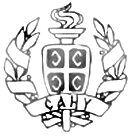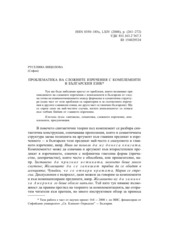Приказ основних података о документу
The problems of the complex sentences with complements in Bulgarian
| dc.creator | Ницолова, Руселина | |
| dc.date.accessioned | 2018-05-19T18:07:48Z | |
| dc.date.available | 2018-05-19T18:07:48Z | |
| dc.date.issued | 2008 | |
| dc.identifier.issn | 0350-185X | |
| dc.identifier.uri | https://dais.sanu.ac.rs/123456789/2918 | |
| dc.description.abstract | The investigation of the complex sentences with complements in Bulgarian is a multifactor analysis, which has to take into account the following issues: a) the lexical meaning of the main predicate, which determines the meaning of the complement in general; b) the grammatical meanings of the main predicate - person (a special role plays the opposition between the speaker and the other participants in communication), number, tense, mood, evidentiality affirmativity or negation; c) the functions of the linking words - complementizers, particles, interrogatives, relatives; d) the meaning of the complement and its related presuppositions or implications (if any), its modality, its illocutionary force, its formal structure, its syntactic position in the complex sentence; e) the combinatorial potential of the matrix sentence and the complement in both aspects - semantic and formal. | en |
| dc.relation | Projekat Sofijskog univerziteta 'Sv. Kliment Ohridski', Bugarska, br. 164 | |
| dc.rights | openAccess | |
| dc.rights.uri | https://creativecommons.org/licenses/by-nc-nd/4.0/ | |
| dc.source | Јужнословенски филолог | |
| dc.title | The problems of the complex sentences with complements in Bulgarian | en |
| dc.type | article | |
| dc.rights.license | BY-NC-ND | |
| dcterms.abstract | Nicolova, Ruselina; | |
| dc.citation.spage | 261 | |
| dc.citation.epage | 272 | |
| dc.citation.issue | 64 | |
| dc.identifier.doi | 10.2298/JFI0864261N | |
| dc.type.version | publishedVersion | |
| dc.identifier.fulltext | https://dais.sanu.ac.rs/bitstream/id/20650/2996.pdf | |
| dc.citation.other | (64): 261-272 | |
| dc.identifier.rcub | https://hdl.handle.net/21.15107/rcub_dais_2918 |
Документи
Овај документ се појављује у следећим колекцијама
-
Јужнословенски филолог / Južnoslovenski filolog
ISSN 0350-185X; eISSN 2406-0763

